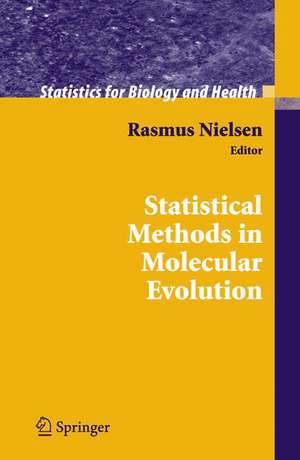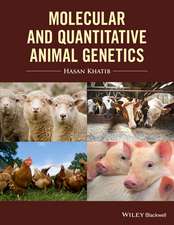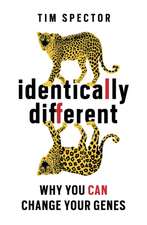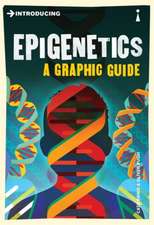Statistical Methods in Molecular Evolution: Statistics for Biology and Health
Editat de Rasmus Nielsenen Limba Engleză Hardback – 21 apr 2005
Most studies in molecular evolution rely heavily on statistical procedures based on stochastic process modelling and advanced computational methods including high-dimensional numerical optimization and Markov Chain Monte Carlo. This book provides an overview of the statistical theory and methods used in studies of molecular evolution. It includes an introductory section suitable for readers that are new to the field, a section discussing practical methods for data analysis, and more specialized sections discussing specific models and addressing statistical issues relating to estimation and model choice. The chapters are written by the leaders of field and they will take the reader from basic introductory material to the state-of-the-art statistical methods.
This book is suitable for statisticians seeking to learn more about applications in molecular evolution and molecular evolutionary biologists with an interest in learning more about the theory behind the statistical methods applied in the field. The chapters of the book assume no advanced mathematical skills beyond basic calculus, although familiarity with basic probability theory will help the reader. Most relevant statistical concepts are introduced in the book in the context of their application in molecular evolution, and the book should be accessible for most biology graduate students with an interest in quantitative methods and theory.
Rasmus Nielsen received his Ph.D. form the University of California at Berkeley in 1998 and after a postdoc at Harvard University, he assumed a faculty position in Statistical Genomics at Cornell University. He is currentlyan Ole Rømer Fellow at the University of Copenhagen and holds a Sloan Research Fellowship. His is an associate editor of the Journal of Molecular Evolution and has published more than fifty original papers in peer-reviewed journals on the topic of this book.
From the reviews:
"...Overall this is a very useful book in an area of increasing importance." Journal of the Royal Statistical Society
"I find Statistical Methods in Molecular Evolution very interesting and useful. It delves into problems that were considered very difficult just several years ago...the book is likely to stimulate the interest of statisticians that are unaware of this exciting field of applications. It is my hope that it will also help the 'wet lab' molecular evolutionist to better understand mathematical and statistical methods." Marek Kimmel for the Journal of the American Statistical Association, September 2006
"Who should read this book? We suggest that anyone who deals with molecular data (who does not?) and anyone who asks evolutionary questions (who should not?) ought to consult the relevant chapters in this book." Dan Graur and Dror Berel for Biometrics, September 2006
"Coalescence theory facilitates the merger of population genetics theory with phylogenetic approaches, but still, there are mostly two camps: phylogeneticists and population geneticists. Only a few people are moving freely between them. Rasmus Nielsen is certainly one of these researchers, and his work so far has merged many population genetic and phylogenetic aspects of biological research under the umbrella of molecular evolution. Although Nielsen did not contribute a chapter to his book, his work permeates all its chapters. This book gives an overview of his interests and current achievements in molecular evolution. In short, this book should be on your bookshelf." Peter Beerli for Evolution, 60(2), 2006
| Toate formatele și edițiile | Preț | Express |
|---|---|---|
| Paperback (1) | 1009.54 lei 6-8 săpt. | |
| Springer – 29 noi 2010 | 1009.54 lei 6-8 săpt. | |
| Hardback (1) | 1395.32 lei 6-8 săpt. | |
| Springer – 21 apr 2005 | 1395.32 lei 6-8 săpt. |
Din seria Statistics for Biology and Health
- 20%
 Preț: 633.23 lei
Preț: 633.23 lei - 17%
 Preț: 352.01 lei
Preț: 352.01 lei - 20%
 Preț: 776.71 lei
Preț: 776.71 lei - 20%
 Preț: 1376.32 lei
Preț: 1376.32 lei - 18%
 Preț: 1394.84 lei
Preț: 1394.84 lei - 18%
 Preț: 883.59 lei
Preț: 883.59 lei - 5%
 Preț: 843.91 lei
Preț: 843.91 lei -
 Preț: 397.16 lei
Preț: 397.16 lei - 20%
 Preț: 1002.67 lei
Preț: 1002.67 lei - 5%
 Preț: 1102.10 lei
Preț: 1102.10 lei - 5%
 Preț: 874.83 lei
Preț: 874.83 lei - 15%
 Preț: 657.39 lei
Preț: 657.39 lei - 18%
 Preț: 960.93 lei
Preț: 960.93 lei - 15%
 Preț: 585.90 lei
Preț: 585.90 lei - 5%
 Preț: 852.69 lei
Preț: 852.69 lei - 18%
 Preț: 903.62 lei
Preț: 903.62 lei - 5%
 Preț: 721.40 lei
Preț: 721.40 lei - 15%
 Preț: 653.46 lei
Preț: 653.46 lei - 18%
 Preț: 2114.90 lei
Preț: 2114.90 lei - 18%
 Preț: 1108.99 lei
Preț: 1108.99 lei - 5%
 Preț: 821.39 lei
Preț: 821.39 lei - 5%
 Preț: 849.02 lei
Preț: 849.02 lei - 15%
 Preț: 653.14 lei
Preț: 653.14 lei - 18%
 Preț: 958.56 lei
Preț: 958.56 lei - 5%
 Preț: 722.69 lei
Preț: 722.69 lei - 18%
 Preț: 728.74 lei
Preț: 728.74 lei - 18%
 Preț: 943.22 lei
Preț: 943.22 lei - 5%
 Preț: 1092.43 lei
Preț: 1092.43 lei - 15%
 Preț: 594.21 lei
Preț: 594.21 lei - 5%
 Preț: 377.87 lei
Preț: 377.87 lei - 18%
 Preț: 1124.60 lei
Preț: 1124.60 lei - 18%
 Preț: 1220.12 lei
Preț: 1220.12 lei - 15%
 Preț: 632.98 lei
Preț: 632.98 lei - 18%
 Preț: 1394.84 lei
Preț: 1394.84 lei -
 Preț: 389.11 lei
Preț: 389.11 lei - 18%
 Preț: 959.98 lei
Preț: 959.98 lei
Preț: 1395.32 lei
Preț vechi: 1701.61 lei
-18% Nou
Puncte Express: 2093
Preț estimativ în valută:
266.99€ • 278.76$ • 220.97£
266.99€ • 278.76$ • 220.97£
Carte tipărită la comandă
Livrare economică 05-19 aprilie
Preluare comenzi: 021 569.72.76
Specificații
ISBN-13: 9780387223339
ISBN-10: 0387223339
Pagini: 505
Ilustrații: XII, 505 p.
Dimensiuni: 155 x 235 x 29 mm
Greutate: 0.85 kg
Ediția:2005
Editura: Springer
Colecția Springer
Seria Statistics for Biology and Health
Locul publicării:New York, NY, United States
ISBN-10: 0387223339
Pagini: 505
Ilustrații: XII, 505 p.
Dimensiuni: 155 x 235 x 29 mm
Greutate: 0.85 kg
Ediția:2005
Editura: Springer
Colecția Springer
Seria Statistics for Biology and Health
Locul publicării:New York, NY, United States
Public țintă
Professional/practitionerCuprins
Markov Models in Molecular Evolution.- to Applications of the Likelihood Function in Molecular Evolution.- to Markov Chain Monte Carlo Methods in Molecular Evolution.- Population Genetics of Molecular Evolution.- Practical Approaches for Data Analysis.- Maximum Likelihood Methods for Detecting Adaptive Protein Evolution.- HyPhy: Hypothesis Testing Using Phylogenies.- Bayesian Analysis of Molecular Evolution Using MrBayes.- Estimation of Divergence Times from Molecular Sequence Data.- Models of Molecular Evolution.- Markov Models of Protein Sequence Evolution.- Models of Microsatellite Evolution.- Genome Rearrangement.- Phylogenetic Hidden Markov Models.- Inferences on Molecular Evolution.- The Evolutionary Causes and Consequences of Base Composition Variation.- Statistical Alignment: Recent Progress, New Applications, and Challenges.- Estimating Substitution Matrices.- Posterior Mapping and Posterior Predictive Distributions.- Assessing the Uncertainty in Phylogenetic Inference.
Recenzii
From the reviews:
"...Overall this is a very useful book in an area of increasing importance." Journal of the Royal Statistical Society
"I find Statistical Methods in Molecular Evolution very interesting and useful. It delves into problems that were considered very difficult just several years ago...the book is likely to stimulate the interest of statisticians that are unaware of this exciting field of applications. It is my hope that it will also help the 'wet lab' molecular evolutionist to better understand mathematical and statistical methods." Marek Kimmel for the Journal of the American Statistical Association, September 2006
"Who should read this book? We suggest that anyone who deals with molecular data (who does not?) and anyone who asks evolutionary questions (who should not?) ought to consult the relevant chapters in this book." Dan Graur and Dror Berel for Biometrics, September 2006
"Coalescence theory facilitates the merger of population genetics theory with phylogenetic approaches, but still, there are mostly two camps: phylogeneticists and population geneticists. Only a few people are moving freely between them. Rasmus Nielsen is certainly one of these researchers, and his work so far has merged many population genetic and phylogenetic aspects of biological research under the umbrella of molecular evolution. Although Nielsen did not contribute a chapter to his book, his work permeates all its chapters. This book gives an overview of his interests and current achievements in molecular evolution. In short, this book should be on your bookshelf." Peter Beerli for Evolution, 60(2), 2006
"This book has managed a rare thing: to become more than the sum of its parts. It provides an introduction to a lot of the most exciting research going on in molecular evolution, describing it from different perspectives and providing readers with a key to explore different aspects of the literature. … Statistical Methods in Molecular Evolution is a strong book … and it should rank highly on Systematic Biology readers’ ‘to buy’ lists." (Simon Whelan, Systematic Biology, Vol. 55 (4), 2006)
"The past few decades have seen a vigorous development … in the field of molecular evolution. … the number of publications in journals at the interface of evolution, genetics, bioinformatics, statistics and probability is steadily increasing. A text which presents a survey in this very interface is therefore highly welcome. … I like the book and recommend it warmly. … The book is a quite lucid and timely survey about probabilistic models and statistical methods in a fascinating field of modern biology." (Anton Wakolbinger, Metrika, Vol. 64, 2006)
"This book provides an overview of the statistical theory and methods used in studies of molecular evolution. … The chapters are written by the leaders in the field and will take the reader from basic introductory material to the state-of-the-art statistical methods. This book is suitable for statisticians seeking to learn more about applications in molecular evolution and molecular evolutionary biologists … . the book should be accessible for most biology graduate students … ." (T. Postelnicu, Zentralblatt MATH, Vol. 1093 (19), 2006)
"...Overall this is a very useful book in an area of increasing importance." Journal of the Royal Statistical Society
"I find Statistical Methods in Molecular Evolution very interesting and useful. It delves into problems that were considered very difficult just several years ago...the book is likely to stimulate the interest of statisticians that are unaware of this exciting field of applications. It is my hope that it will also help the 'wet lab' molecular evolutionist to better understand mathematical and statistical methods." Marek Kimmel for the Journal of the American Statistical Association, September 2006
"Who should read this book? We suggest that anyone who deals with molecular data (who does not?) and anyone who asks evolutionary questions (who should not?) ought to consult the relevant chapters in this book." Dan Graur and Dror Berel for Biometrics, September 2006
"Coalescence theory facilitates the merger of population genetics theory with phylogenetic approaches, but still, there are mostly two camps: phylogeneticists and population geneticists. Only a few people are moving freely between them. Rasmus Nielsen is certainly one of these researchers, and his work so far has merged many population genetic and phylogenetic aspects of biological research under the umbrella of molecular evolution. Although Nielsen did not contribute a chapter to his book, his work permeates all its chapters. This book gives an overview of his interests and current achievements in molecular evolution. In short, this book should be on your bookshelf." Peter Beerli for Evolution, 60(2), 2006
"This book has managed a rare thing: to become more than the sum of its parts. It provides an introduction to a lot of the most exciting research going on in molecular evolution, describing it from different perspectives and providing readers with a key to explore different aspects of the literature. … Statistical Methods in Molecular Evolution is a strong book … and it should rank highly on Systematic Biology readers’ ‘to buy’ lists." (Simon Whelan, Systematic Biology, Vol. 55 (4), 2006)
"The past few decades have seen a vigorous development … in the field of molecular evolution. … the number of publications in journals at the interface of evolution, genetics, bioinformatics, statistics and probability is steadily increasing. A text which presents a survey in this very interface is therefore highly welcome. … I like the book and recommend it warmly. … The book is a quite lucid and timely survey about probabilistic models and statistical methods in a fascinating field of modern biology." (Anton Wakolbinger, Metrika, Vol. 64, 2006)
"This book provides an overview of the statistical theory and methods used in studies of molecular evolution. … The chapters are written by the leaders in the field and will take the reader from basic introductory material to the state-of-the-art statistical methods. This book is suitable for statisticians seeking to learn more about applications in molecular evolution and molecular evolutionary biologists … . the book should be accessible for most biology graduate students … ." (T. Postelnicu, Zentralblatt MATH, Vol. 1093 (19), 2006)
Textul de pe ultima copertă
In the field of molecular evolution, inferences about past evolutionary events are made using molecular data from currently living species. With the availability of genomic data from multiple related species, molecular evolution has become one of the most active and fastest growing fields of study in genomics and bioinformatics.
Most studies in molecular evolution rely heavily on statistical procedures based on stochastic process modelling and advanced computational methods including high-dimensional numerical optimization and Markov Chain Monte Carlo. This book provides an overview of the statistical theory and methods used in studies of molecular evolution. It includes an introductory section suitable for readers that are new to the field, a section discussing practical methods for data analysis, and more specialized sections discussing specific models and addressing statistical issues relating to estimation and model choice. The chapters are written by the leaders in the field and they will take the reader from basic introductory material to the state-of the-art statistical methods.
This book is suitable for statisticians seeking to learn more about applications in molecular evolution and molecular evolutionary biologists with an interest in learning more about the theory behind the statistical methods applied in the field. The chapters of the book assume no advanced mathematical skills beyond basic calculus, although familiarity with basic probability theory will help the reader. Most relevant statistical concepts are introduced in the book in the context of their application in molecular evolution, and the book should be accessible for most biology graduate students with an interest in quantitative methods and theory.
Rasmus Nielsen received his Ph.D. form the University of California at Berkeley in 1998 and after a postdoc at Harvard University, he assumed a faculty position in Statistical Genomics at Cornell University. He is currently an Ole Rømer Fellow at the University of Copenhagen and holds a Sloan Research Fellowship. His is an associate editor of the Journal of Molecular Evolution and has published more than fifty original papers in peer-reviewed journals on the topic of this book.
Most studies in molecular evolution rely heavily on statistical procedures based on stochastic process modelling and advanced computational methods including high-dimensional numerical optimization and Markov Chain Monte Carlo. This book provides an overview of the statistical theory and methods used in studies of molecular evolution. It includes an introductory section suitable for readers that are new to the field, a section discussing practical methods for data analysis, and more specialized sections discussing specific models and addressing statistical issues relating to estimation and model choice. The chapters are written by the leaders in the field and they will take the reader from basic introductory material to the state-of the-art statistical methods.
This book is suitable for statisticians seeking to learn more about applications in molecular evolution and molecular evolutionary biologists with an interest in learning more about the theory behind the statistical methods applied in the field. The chapters of the book assume no advanced mathematical skills beyond basic calculus, although familiarity with basic probability theory will help the reader. Most relevant statistical concepts are introduced in the book in the context of their application in molecular evolution, and the book should be accessible for most biology graduate students with an interest in quantitative methods and theory.
Rasmus Nielsen received his Ph.D. form the University of California at Berkeley in 1998 and after a postdoc at Harvard University, he assumed a faculty position in Statistical Genomics at Cornell University. He is currently an Ole Rømer Fellow at the University of Copenhagen and holds a Sloan Research Fellowship. His is an associate editor of the Journal of Molecular Evolution and has published more than fifty original papers in peer-reviewed journals on the topic of this book.
Caracteristici
Provides a comprehensive review of the many interesting statistical problems arising in molecular evolution provided by the leading researchers in the field











